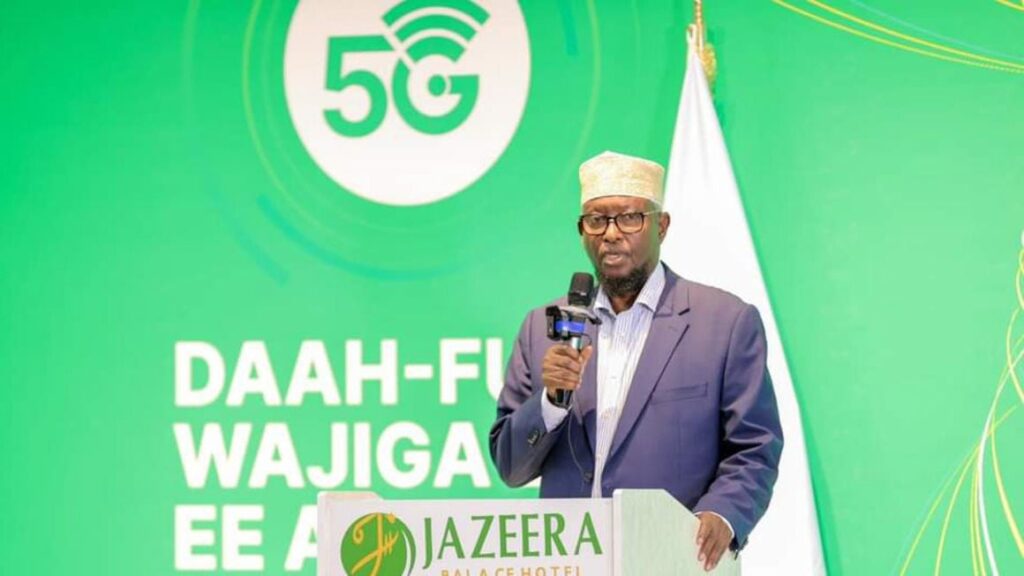- Hormuud Telecom has launched the 5G network across Somalia, enhancing the speed of internet and communication.
- This marks a significant leap towards a digitally inclusive society with reliable internet connectivity in the country.
- A 5G networks is set to stimulate economic growth, create jobs, and revolutionize public services such as healthcare and education.
Hormuud Telecom has unveiled its 5G network, marking a historic moment for its main market Somalia, which now enters into the elite group of African nations such as Kenya and Ethiopia that have embraced this cutting-edge technology.
Hormuud Telecom 5G signal is now present across 30 cities and towns, promising to revolutionize the speed of the internet and communication and transform Somalia’s digital economy.
Enhancing Communication with 5G Technology
The introduction of the 5G network by Hormuud Telecom signifies a monumental leap in improving internet connectivity’s speed and reliability across Somalia. President Hassan Sheikh Mohamud, along with other dignitaries, celebrated the launch, recognizing it as the inception of the fastest network within the country.
Hormuud Telecom’s initiative ensures over 80 per cent coverage, ushering in an era of faster and more reliable internet connectivity. This advancement is pivotal, especially for those reliant on mobile money services, which facilitate business and leisure activities with unparalleled ease and efficiency.
Read also: Nala Money: Inside the Billion Digital Payments Ambition
Empowering Societies Through Digital Innovation
The rollout of the 5G network by Hormuud Telecom is more than just a technological upgrade; it symbolizes Somalia’s stride towards a digitally inclusive society. As articulated by Hormuud Telecom CEO Ahmed Yusuf, this initiative transcends connectivity, aiming to empower communities, stimulate progress, and pave the path towards a flourishing society where digital inclusion is not just an aspiration but a reality.
With the promise of 5G’s benefits—such as enhanced internet speeds and improved services across healthcare, education, and agriculture—Hormuud Telecom is committed to ensuring that this technology is accessible to all, fostering a future where the entire community can harness the potential of this advanced technology.
In unveiling the 5G network, Hormuud Telecom sets the stage for a transformative impact on Somalia’s economy and society. With potential internet speeds ranging from 10 GHz to 400 GHz per single wavelength and total capacity reaching up to 38 GHz, the implications for the speed of the internet and communication are profound.
This development is a testament to Somalia’s commitment to fostering growth and constant improvement, representing a critical milestone in the nation’s journey towards stability and a digitally inclusive future.
Through this significant technological advancement, Hormuud Telecom not only aims to enhance the daily lives of Somalis but also to ensure the country’s competitive edge in the global digital economy.
The introduction of the 5G network by Hormuud Telecom in Somalia opens a transformative era for the nation, with wide-ranging impacts that extend far beyond the realms of enhanced internet speeds and connectivity. This technological leap promises to catalyze economic growth, improve public services, and foster innovation, setting a precedent for a future-oriented Somalia.
The deployment of the 5G network has the potential to stimulate significant economic growth within Somalia. By providing ultra-fast internet speeds and reliable connectivity, it enables businesses to operate more efficiently and explore new markets, both locally and internationally.
This digital infrastructure is vital for attracting foreign investment, encouraging startups, and fostering the growth of the digital economy. Moreover, the expansion of 5G will likely create numerous jobs, from technical roles in network maintenance and cybersecurity to positions in emerging tech sectors that the new network will enable, contributing to a reduction in unemployment rates.
5G technology has the potential to revolutionize public services by enabling smart city initiatives, such as intelligent traffic management systems that can reduce congestion and improve road safety. In healthcare, 5G can facilitate telemedicine services, allowing for real-time remote diagnostics and treatment, which is particularly crucial for rural areas with limited access to medical facilities.
Furthermore, in education, the high-speed network can support interactive and immersive learning experiences, bridging the educational gap and promoting inclusivity.
Read also: Internet outages in West African states due to cable cuts; repairs could take months
Hormuud Telecom: Fostering innovation and technological advancement
The introduction of 5G in Somalia opens the door to a wave of innovation and technological advancement. It provides a foundation for the development of new technologies such as the Internet of Things (IoT), artificial intelligence (AI), and augmented and virtual reality (AR/VR) applications.
These technologies can transform various sectors, including agriculture, where IoT devices can monitor crop conditions in real-time, and retail, where AI and AR can create personalized shopping experiences. This environment conducive to innovation will likely spur the growth of a vibrant tech startup ecosystem, positioning Somalia as a hub for technological innovation in Africa.
